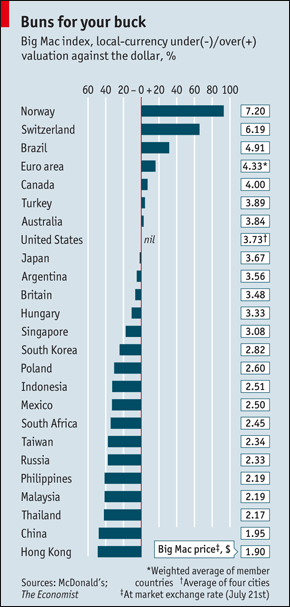October 1st 2010
Brazilian Real at 2-Year High Despite “Currency War”
Brazil is beating the drumbeat of war. The forex variety, that is. According to the Finance Minister, “We’re in the midst of an international currency war, a general weakening of currency. This threatens us because it takes away our competitiveness.” By its own admission, Brazil will not be sitting on the sidelines of this war. Rather, it will do battle on behalf of its currency, the Real.
Brazil’s concerns are perhaps justified, since the Brazilian Real has surged to a 2-year high, and is amazingly not worth more than prior to the collapse of the Lehman Brothers and the ignition of the global financial crisis. (If anything, this shows just how far we’ve come in returning to stability). According to Goldman Sachs, the Real is now the most overvalued major currency in the world. This is confirmed by The Economist’s Big Mac Index, which shows that in Purchasing Power Parity (PPP) terms, Brazil is now the third most expensive country in the world, behind only Norway and Switzerland.

It’s not hard to understand why the Real is soaring. Its benchmark Selic rate is 10.75%, with government bonds yielding an even higher 12%. Even after controlling inflation, this is the highest among major currencies. Its economy is booming; GDP is projected at 10% in 2010. As a result, capital flow inflows have returned to pre-credit crisis levels: “Net foreign-exchange inflows totaled $11.14 billion in the September 1-17 period, up from $2.11 billion in the first 10 days of the month, according to data released Tuesday by the country’s central bank.” The inflows have been driven by a $70 Billion stock offering by PetroBras, the (formerly) state-owned oil company. It is a record sum, and over 3 times bigger than the eye-popping $23 Billion the Agricultural Bank of China raised only a few months ago. “If the Petrobras deal had never happened, the real might currently be trading somewhere around 1.75 per dollar,” compared to 1.70 today. With other companies rushing to follow suit with debt and equity offerings, cash will probably continue to pour in.
As I said at the beginning of this post, the Bank of Brazil has several tools up its sleeve. It has already resumed “surprise daily auctions to buy excess dollars in the spot market” (suspended in 2006), in which investors can trade Dollars for Brazilian government debt. It is also proposing reverse currency swaps, which would serve a similar purpose. ” ‘The order is to buy, buy and buy,’ ” said a government source. It has purchased nearly $1 Billion in foreign currency in the month of September alone, and has pledged to deploy its $10 Billion Sovereign investment fund if necessary. Finally, there is talk of raising the tax rate (currently 2%) on all foreign capital inflows, though there is no real timetable for such a move.
Alas, while the government of Brazil is certainly sincere in its intentions to hold down the Real, it lacks the wherewithal. Its $1 Billion intervention in September was dwarfed by the $20+ Billion spent by the Bank of Japan in one day to hold down the Yen. Even controlling for the difference in the size of their respective economies, Brazil has still been thoroughly outspent. Its $10 Billion investment fund pales in comparison to the ~$1 Trillion forex reserves of Japan. In short, Brazil would be wise to avoid full-fledged engagement in currency war.
Besides, the Real strength can better be seen in terms of weakness in the US Dollar and other G4 currencies. In this regard, Brazil’s measly purchases of US Dollars on the spot market probably won’t do much to counter the gradual exodus of cash from safe-havens back into growth currencies. Perhaps, it can take solace in the fact that the Real is so overvalued that it would seem to have no place to go but down.



